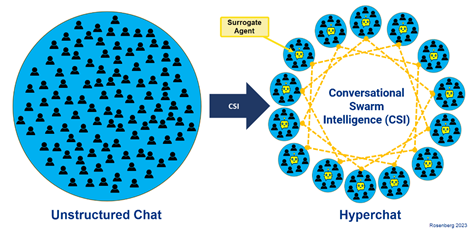Join our daily and weekly newsletters for the latest updates and exclusive content on industry-leading AI coverage. Learn More
Imagine if a large team of 200 people could hold a thoughtful real-time conversation in which they efficiently brainstorm ideas, share knowledge, debate alternatives and quickly converge on AI-optimized solutions. Is this possible — and if so, would it amplify their collective intelligence?
There is a new generative AI technology, conversational swarm intelligence (or simply hyperchat), that enables teams of potentially any size to engage in real-time conversations and quickly converge on AI-optimized solutions. To put this to the test, I asked the research team at Unanimous AI to bring together 50 random sports fans and task that large group with quickly creating a March Madness bracket through real-time conversational deliberation.
Before I tell you how the experiment is going, I need to explain why we can’t just bring 50 people into a Zoom meeting and have them quickly create a bracket together. Research shows that the ideal size for a productive real-time conversation is only 4 to 7 people. In small groups, each individual gets a good amount of airtime to express their views and has low wait time to respond to others. But as group size grows, airtime drops, wait-time rises — and by a dozen people it devolves into a series of monologues. Above 20 people, it’s chaos.
So how can 50 people hold a conversation, or 250, or even 2,500?
Hyperchat works by breaking any large group into a set of parallel subgroups. It then adds an AI agent into each subgroup called a “conversational surrogate” tasked with distilling the human insights within its local group and quickly sharing those insights as natural dialog with other groups. These surrogate agents enable all the subgroups to overlap, weaving local conversations into a single large conversation. And, it works, enabling groups of potentially any size to brainstorm, prioritize, debate and converge in real-time.

Hyperchat technology was invented not just to make communication and collaboration highly efficient at large scale, but to significantly amplify group intelligence. Progress has been rapid on this front, and already enterprise teams are using a commercial platform called Thinkscape® that enables hundreds of people to hold optimized deliberations in real-time.
But does hyperchat technology really make teams smarter (and can it predict March Madness outcomes)?
To test this in full public view, I asked the team at Unanimous AI to bring together 50 random sports fans in their Thinkscape platform and create a March Madness bracket. The resulting bracket was then entered into the ESPN March Madness contest so we can track how well it does against 30 million other people. Remarkably, the bracket created by 50 random people is performing in the 99th percentile (top 1.4%) in the ESPN contest. Here are the stats:

Of course, anything can happen as the tournament continues this week, but so far, the collective intelligence created among this hyper-chatting group of fans is outperforming my expectations. This is not the first time this technology has surprised me.
In a 2024 study by researchers at Carnegie Mellon and Unanimous AI, groups of 35 people were asked to take standard IQ tests by hyperchat. Results showed that groups of random participants, who averaged an IQ of 100 (the 50th percentile) when working on their own, scored an effective IQ of 128 (the 97th percentile) when deliberating conversationally in the hyperchat platform. This is gifted-level performance.
In another 2024 study, groups of 75 people were asked to brainstorm together in real-time to solve a creative challenge. The groups did this multiple times, half using standard chat and half using hyperchat in Thinkscape. The groups then compared the experience and reported that when communicating via hyperchat, they felt more productive, more collaborative and surfaced better solutions (p<0.001). They also reported having more “buy-in” to the solutions that emerged and feeling “more ownership” in the process (p<0.001).
This technology has excited me for a long time, not just because it makes human groups smarter. It also has the ability to enable hybrid groups of human participants and AI agents to collaborate at unlimited scale, enabling optimized decisions that keep humans in the loop. Doing this requires the addition of a second type of AI agent to the hyperchat structure known as a “contributor agent.” These agents conversationally provide real-time factual content to support the ongoing human deliberation. The goal is to enable a hybrid collective superintelligence.
This hybrid technique was first tested in a 2024 study that brought together groups of humans and AI agents to field fantasy baseball teams using a real-time hyperchat structure. The results showed that large collaborating groups found the hyperchat structure to be a highly productive means of deliberation, with 87% of participants expressing that it led to significantly better decisions.

Overall, conversational swarm intelligence is a powerful use of AI Agents that could radically transform collaboration by enabling real-time conversations among teams of potentially any size. Considering that the average Fortune 1000 company has more than 30,000 employees and has functional teams with hundreds of members, this could solve the longstanding bottleneck that has limited real-time deliberations to small teams. It is also an efficient way to leverage the power of AI in critical decisions while keeping humans in control.
The men’s March Madness tournament continues this week. Anything could happen, but I suspect the collective intelligence harnessed from those 50 random sports fans will do very well. We shall see…
Louis Rosenberg founded Immersion Corp and Unanimous AI.


